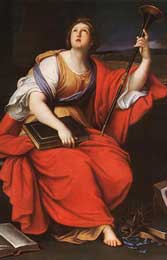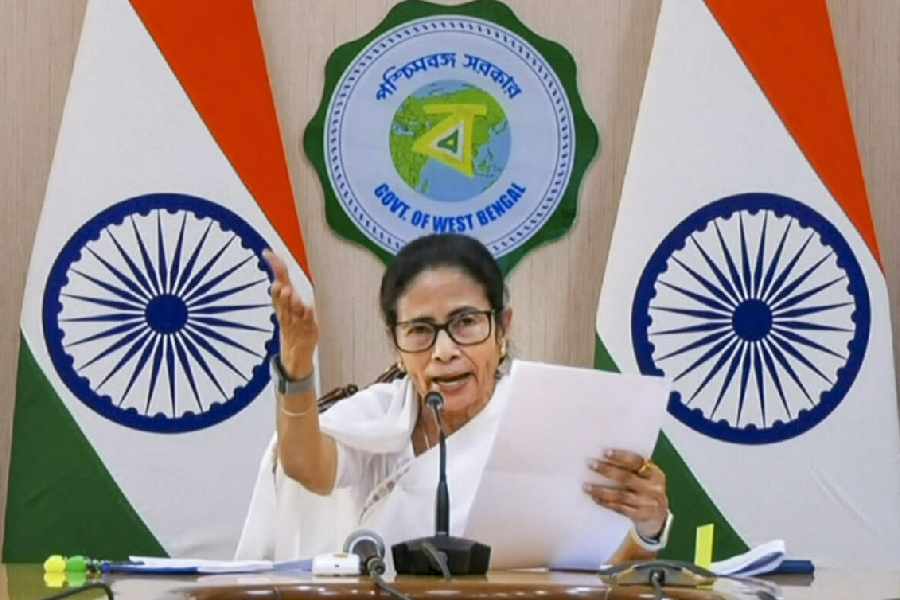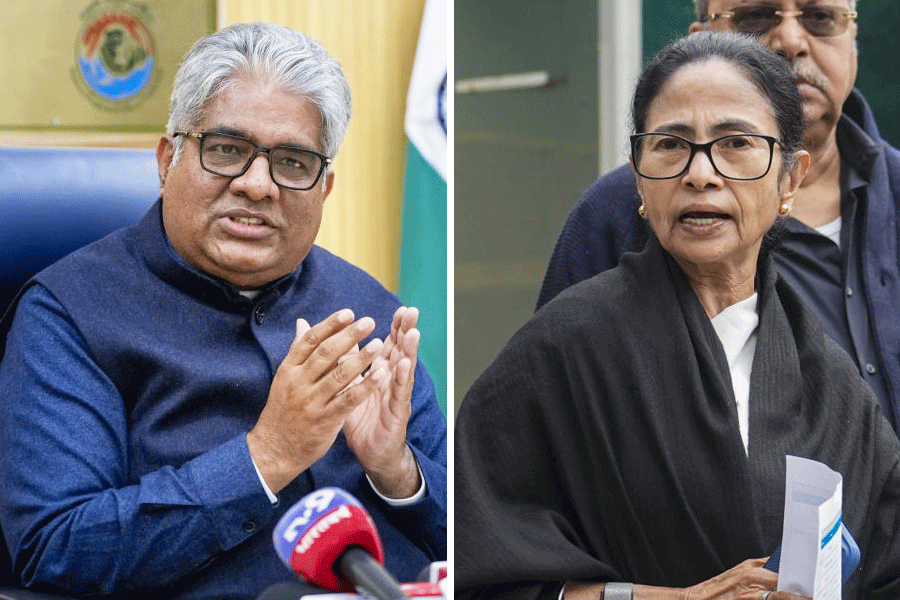|
|
| Clio: not an altar |
Towards the end of Bertolt Brecht?s play, The Life of Galileo, there is a scene in which his three pupils and his daughter are waiting for the verdict of the Inquisition on Galileo. The scientist has already been in prison for twenty-seven days, the cross-examination is over and the verdict is to be announced any moment. The daughter is praying that Galileo will recant. The pupils are confident that their master will never recant and betray the cause of science. The bells of St Mark?s begin to toll announcing that Galileo has recanted. Galileo enters the stage, completely altered by the trial, utterly unrecognizable. As he enters, he hears one of his pupils declaim, ?Unhappy the land that has no heroes.? Galileo sits down on a stool and the dramatist makes him utter calmly the following line, ?No. Unhappy the land that is in need of heroes.?
That line resonates with contemporary relevance. Suddenly, a film on a rebel sepoy of 1857 has brought into public debate the whole issue of using history to create legends. The need for creating national icons and the relationship of history with nation-building has become a subject of public discussion. The plea has been made in these columns (?What we like to believe?, by Swapan Dasgupta, August 26) that there is need to bring romance back into history even if this leads to distortion. History has to be inspirational, the argument runs, and help in nation-building.
Indian historians, the charge has been levelled, have singularly failed in this task because they write badly and also because they choose to concentrate on boring economic and social history instead of the heroic deeds of individuals. Indian historians have failed to make the subject of history popular because they have tried to make the writing of history more rigorous and scientific.
Embedded in this argument is the old debate about the nature of history: is it science or is it art? Is it just a narrative of political events or is it an analysis of the socio-political process? In the hands of a master it is invariably all these things and more. Students of history will recall in this context the analytical rigour and the literary powers of E.P. Thompson or the evocation of the age of chivalry that Marc Bloch combined with a structural analysis of feudal society. It is not always the case that political history is invariably a delight to read. Geoffrey Elton?s great studies of the Tudor age were masterly in their depiction of the Tudor administrative and political system. But no one in his right mind would recommend Elton for his prose. Style is an individual gift; it has little or nothing to do with the historian?s choice of subject matter. Gibbon?s prose was memorable but how many, save the most dedicated student of history, read him today, especially for sheer pleasure.
But there is a much more important point at stake here than the readability of historians. That point concerns the relationship history-writing has with nation-building. This is particularly relevant for India where since the late 19th century history has indeed been harnessed to the cause of making the Indian nation. The discourse of history, as Hegel noted, has a bias in favour of the state since it tries to bring the state to the centre of historical narratives. History tends to become the story of the state.
In India, history-writing, as distinct from court chronicles, began with the British attempt to appropriate India?s past. The process began, in the hands of James Mill, as a denial of India?s pre-British past. India had no history, Mill declared. History in India began with the establishment of British rule when Indian history came to form ?an entire and highly interesting portion of British history??. Indian nationalism began its career with many attempts to reclaim India?s past. India had its own history, which should be written by Indians themselves so that history-writing could be freed of lies and distortions introduced by foreign rule and its attendant historiography. This was one of the rallying cries of Indian nationalism. ?We have no history. We must have a history,? wrote Bankimchandra Chattopadhyay.
History thus came to be used for the project of nation-building. The claim to recall one?s own past, articulated most strongly in the late 19th century by Bankimchandra, was nothing more than a claim to have the power to represent oneself. History became a battleground for poli- tical power itself. Throughout the history of the nationalist move- ment, writers and political leaders engaged themselves in the task of retelling the past to fulfill a political agenda. Apart from the novels and essays of Bankimchandra, the books of R.C. Dutt, V.D. Savarkar?s invocation of 1857, Jawaharlal Nehru?s Discovery of India and many other books and tracts were all attempts, in different ways, to remember the past to instill pride in the motherland and even to engage in action against the foreign ruler.
Even after independence, this attempt to infuse history-writing with nationalism continued, and professional historians were used by the Indian state to write history. Tara Chand?s History of the Freedom Movement and S.N. Sen?s 1857 were important milestones. But history-writing outside the aegis of the state, the writings of R.C. Majumdar are important examples, was also imbued with the spirit of nationalism. The state?s involvement in history writing increased with the formation of the Indian Council for Historical Research in the early Seventies. A particular interpretation of Indian history came to be projected as the authorized version. This had somewhat dubious implications in the field of the history of the Indian national movement. A unilinear view of the anti-colonial struggle received the official sanction. Movements and tendencies outside the fold of the Congress-led struggle received little or no attention. Because historiography became the voice of the state, the past was coloured by the state?s ideology. Secularism was discovered even where it did not exist and all that was obviously non-secular was seen as an aberration. Many liberal and Marxist historians made themselves part of this state-sponsored history-writing exercise.
Despite the influence of Marxism and of academic history-writing, this state-driven project had a hero. Here the hero was not an individual but the hero was the Indian nation, which had emerged through an epic struggle against oppression and exploitation, and had thus made history.
This version has, in recent years, come to be questioned. One kind of objection has come from the sangh parivar, which has no objections to either the state being involved in history-writing or to using history for nation-building. They also have no objections to projecting the nation in heroic terms. They only want the secular nation to become a Hindu nation, secular heroes to be replaced by Hindu heroes. This is a call for a shift in political and ideological slant.
The other objection is more fundamental because it is based on issues regarding the nature and purpose of history-writing. History, proponents of this view argue, should not be put to the service of the state. History should question the claims the state makes for itself and also refuse to surrender the past to the state?s attempts to appropriate it. History-writing is not about nation-building. It may have performed this function at one time during the nationalist movement, which also created legends and heroes.
History originates out of myths and legends; ancient Indian history is a good example of this. But history also demarcates itself from myths and legends by marking out for itself a discipline that is determined by facts, interpretation of facts and a discourse of proof and verification. Historians of India ? and all of them are not Indians ? have over the years engaged themselves in writing history according to this discipline. The task of the historian is to demystify myths ? myths relating to nationalism, British rule, the glory of the past and so on. Clio is happiest without heroes and without a political agenda. A land is happy with its myths, but does not need historians or filmmakers to create them. Unhappy the historian who has to create myths.











